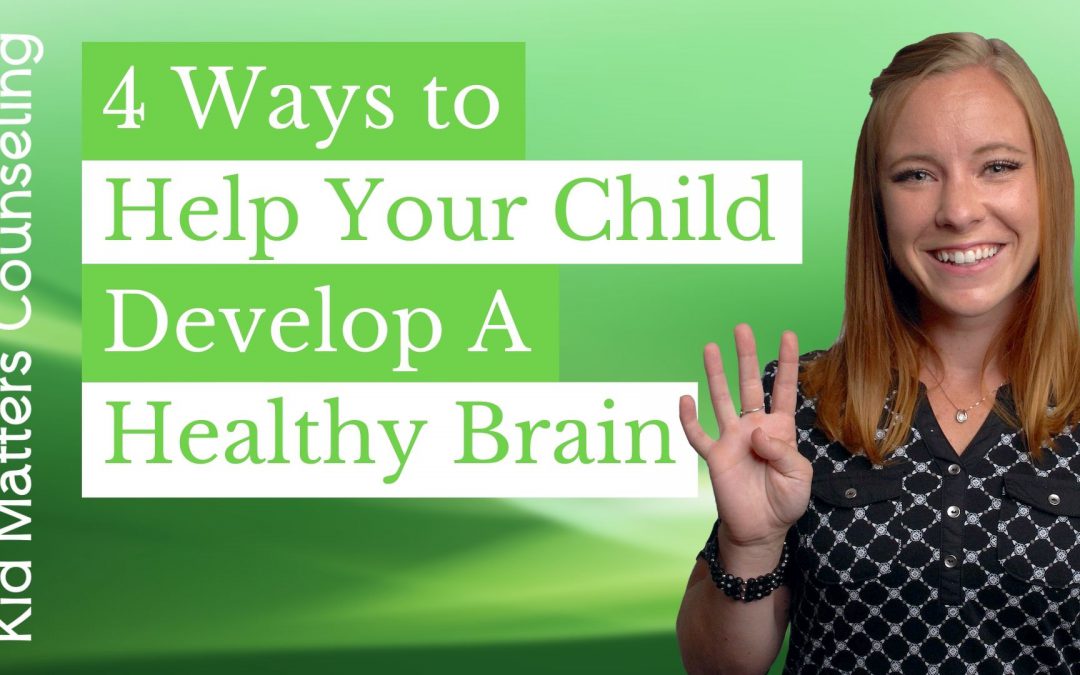If you’re like most parents, you balance many tasks, work hard every day to provide for your child, and find that time is of the essence. You want to help your child make positive choices, problem solve, take responsibility, and manage their feelings.
The problem is, your child’s brain is busy too! Each moment, they are processing over 400 billion bits of sensory data! On top of that, it sometimes seems like their growing mind and our fast-paced society make it difficult to slow down and build the skills necessary to succeed.
Growing a strong and healthy brain and body is tough work!
Here are 4 simple strategies you can add into your day-to-day life for helping your child’s brain develop in a wholesome and meaningful way.
Practice Logic and Problem-Solving
The first tip is to proactively practice logic and problem-solving during times your child is calm and collected. An example of this is to play a game of “what would you do?”. Some questions might be, “If you saw a friend being bullied at school and there weren’t any adults around, what could you do?” or, “If you found a toy at the park and really wanted it, but knew it belonged to someone else, what would you do?”
It may be tempting during this time to rescue your child if they struggle with the question, solve the problem, or even give them the best answer. Remind yourself that this learning experience is helping their brain develop the skills they need to problem solve, overcome challenges, and think critically.
Provide Choices and Options
The next tip is making every opportunity through the day to provide choices. Giving options helps your child to use parts of their brain that are still trying to develop. It strengthens these parts just like a muscle, helps them think through their decisions, and gain a sense of responsibility to use later in life.
Some examples of providing choices for a young child might be, “Do you want to wear your red shirt or your blue shirt today?” or even as simple as, “do you want a sandwich or pasta for lunch?”. For young children, provide little choices, and for big kids, bigger choices.
Connect and Redirect
Inevitably, there are times when your child becomes so upset that it seems impossible to problem-solve, provide choices, or reason with them. And to normalize your experience, that is true. During these high-stress moments, the logic and reasoning side of your child’s brain temporarily disengages. Instead, they are operating out of emotion and impulse.
For this reason, we can use a tactic called “connect and redirect” which involves first connecting to the child’s emotions. This might look like getting down to your child’s level and saying, “it looks like you are feeling really angry right now” or “this is really hard”, using empathetic non-verbals, and if appropriate, physical touch like a hug.
When a child is really upset, logic will likely not work until we soothe the highly emotional brain by connecting with it. This helps shift the child’s state from reactive to receptive. Then, logic can be more easily heard and understood by the brain. By first connecting, we help the child regulate, so then redirection to problem-solving is possible.
Role Model
The last tip aims to take the pressure off of you. You are a parent but you’re a human first. This means you won’t always get it right. Parenting is messy and the weight to help your child grow can feel like a lot.
The good news is, even in those less-than-ideal parenting moments, when you yell or say something you regret, there is just as much opportunity for learning. Your child’s brain loves to see how conflict and confusion can resolve with connection and repair. By acknowledging your own mistakes, owning challenges with problem solving skills, and making good choices, your child sees how you’re not perfect and so they don’t have to be either.
If you need extra support in helping your child’s developing brain, check out Kid Matters Blog or schedule an appointment today.
Resources:
Siegel, D. J., & Payne Bryson, T. (2011). The whole-brain child: 12 revolutionary strategies to nurture your child’s developing mind. Bantam Books.
Dispenza, J. (2009). Evolve your brain: The science of changing your mind. Deerfield Beach, FL: Health Communications.

Molly Monaghan
Child Therapist | LPC
My goal is to walk alongside you as we uncover ways to root yourself in your own wisdom as a caregiver, and help your child blossom into their full potential.
New Clients Call: (855) 586-1802
Current Clients: (855) 543-7687
Ask Us Anything!
We help anxious kids and frustrated parents. We serve Hinsdale & the Western Suburbs of Chicago.
Made with ♥︎ in Hinsdale, Illinois for Chicago
Built By Brand Your Practice.
Kid Matters Counseling, P.C. DISCLAIMER: This website and blog are for informational, educational and general discussion purposes only. It is understood that no guarantee or warranty arises from the information provided, discussed or commented upon in this website and blog nor does it constitute legal or other professional advice on any subject matter. Access to this website and blog is voluntary and at the sole risk of the user. If you think that you have a medical emergency (including clinical), call your doctor or 911 immediately. A licensed medical professional should be consulted for diagnosis and treatment of any and all medical conditions. While the information contained within this website and blog is periodically updated, no guarantee is given that the information provided is correct, complete, and/or up-to-date. See our complete Privacy Policy and Terms of Service.





